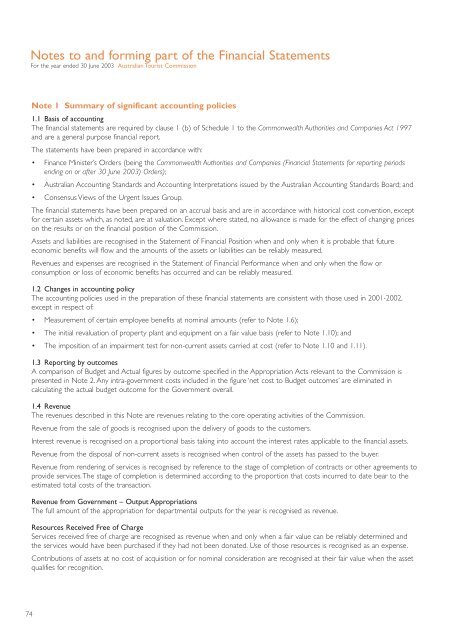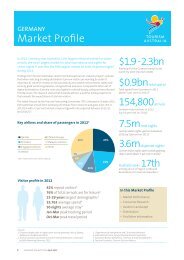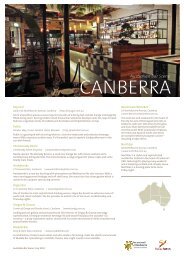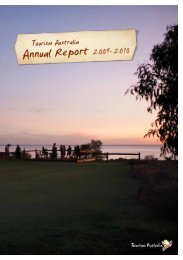2002 - 2003 Annual Report - Tourism Australia
2002 - 2003 Annual Report - Tourism Australia
2002 - 2003 Annual Report - Tourism Australia
Create successful ePaper yourself
Turn your PDF publications into a flip-book with our unique Google optimized e-Paper software.
Notes to and forming part of the Financial Statements<br />
For the year ended 30 June <strong>2003</strong> <strong>Australia</strong>n Tourist Commission<br />
Note 1 Summary of significant accounting policies<br />
1.1 Basis of accounting<br />
The financial statements are required by clause 1 (b) of Schedule 1 to the Commonwealth Authorities and Companies Act 1997<br />
and are a general purpose financial report.<br />
The statements have been prepared in accordance with:<br />
• Finance Minister’s Orders (being the Commonwealth Authorities and Companies (Financial Statements for reporting periods<br />
ending on or after 30 June <strong>2003</strong>) Orders);<br />
• <strong>Australia</strong>n Accounting Standards and Accounting Interpretations issued by the <strong>Australia</strong>n Accounting Standards Board; and<br />
• Consensus Views of the Urgent Issues Group.<br />
The financial statements have been prepared on an accrual basis and are in accordance with historical cost convention, except<br />
for certain assets which, as noted, are at valuation. Except where stated, no allowance is made for the effect of changing prices<br />
on the results or on the financial position of the Commission.<br />
Assets and liabilities are recognised in the Statement of Financial Position when and only when it is probable that future<br />
economic benefits will flow and the amounts of the assets or liabilities can be reliably measured.<br />
Revenues and expenses are recognised in the Statement of Financial Performance when and only when the flow or<br />
consumption or loss of economic benefits has occurred and can be reliably measured.<br />
1.2 Changes in accounting policy<br />
The accounting policies used in the preparation of these financial statements are consistent with those used in 2001-<strong>2002</strong>,<br />
except in respect of:<br />
• Measurement of certain employee benefits at nominal amounts (refer to Note 1.6);<br />
• The initial revaluation of property plant and equipment on a fair value basis (refer to Note 1.10); and<br />
• The imposition of an impairment test for non-current assets carried at cost (refer to Note 1.10 and 1.11).<br />
1.3 <strong>Report</strong>ing by outcomes<br />
A comparison of Budget and Actual figures by outcome specified in the Appropriation Acts relevant to the Commission is<br />
presented in Note 2. Any intra-government costs included in the figure ‘net cost to Budget outcomes’ are eliminated in<br />
calculating the actual budget outcome for the Government overall.<br />
1.4 Revenue<br />
The revenues described in this Note are revenues relating to the core operating activities of the Commission.<br />
Revenue from the sale of goods is recognised upon the delivery of goods to the customers.<br />
Interest revenue is recognised on a proportional basis taking into account the interest rates applicable to the financial assets.<br />
Revenue from the disposal of non-current assets is recognised when control of the assets has passed to the buyer.<br />
Revenue from rendering of services is recognised by reference to the stage of completion of contracts or other agreements to<br />
provide services.The stage of completion is determined according to the proportion that costs incurred to date bear to the<br />
estimated total costs of the transaction.<br />
Revenue from Government – Output Appropriations<br />
The full amount of the appropriation for departmental outputs for the year is recognised as revenue.<br />
Resources Received Free of Charge<br />
Services received free of charge are recognised as revenue when and only when a fair value can be reliably determined and<br />
the services would have been purchased if they had not been donated. Use of those resources is recognised as an expense.<br />
Contributions of assets at no cost of acquisition or for nominal consideration are recognised at their fair value when the asset<br />
qualifies for recognition.<br />
74

















